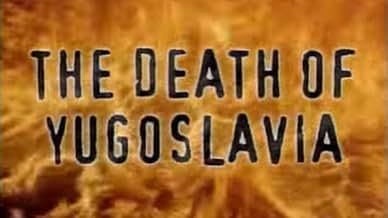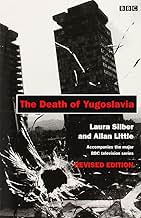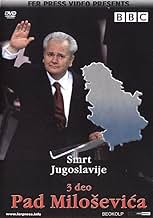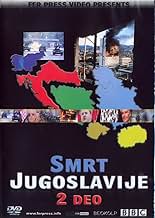The Death of Yugoslavia
- TV Mini Series
- 1995–1996
- 50m
IMDb RATING
8.6/10
1.5K
YOUR RATING
This documentary series covers the struggles of the Yugoslavian people during the collapse of their country, and the subsequent wars to finally find hope with the signing of the Final Peace ... Read allThis documentary series covers the struggles of the Yugoslavian people during the collapse of their country, and the subsequent wars to finally find hope with the signing of the Final Peace Accords.This documentary series covers the struggles of the Yugoslavian people during the collapse of their country, and the subsequent wars to finally find hope with the signing of the Final Peace Accords.
- Won 1 BAFTA Award
- 1 win & 1 nomination total
Browse episodes
8.61.4K
1
2
3
4
5
6
7
8
9
10
Featured reviews
Hand washing of big nations
Dear gentlemen,
I don't won't to waste my life by talking about politics, so my comment will be quite short and precise. The thing is that this movie is made by one side in the conflict. Which one? Of course, UK and USA. Therefor it cannot be objective in any way. In every country of Former Yugoslavia there is a opinion that there is at least 50 % of guilt for wars in Yugoslavia that could be blamed on foreign countries and their secret services, Germany and USA in particular. Also, Death and sufferings of civilians were used so many times in propaganda purposes by USA gov. The most flagrant use of media in those purposes is demonstrated in the movie that deals with making up the war in Albania ( I think that Al Pacino has a role of American president, but I'm not sure). Anyways, I am trying to be objective and pretty liberal, so, I am not putting myself in either side of the conflicts, although I come from Serbia. Nice greets to everyone!
I don't won't to waste my life by talking about politics, so my comment will be quite short and precise. The thing is that this movie is made by one side in the conflict. Which one? Of course, UK and USA. Therefor it cannot be objective in any way. In every country of Former Yugoslavia there is a opinion that there is at least 50 % of guilt for wars in Yugoslavia that could be blamed on foreign countries and their secret services, Germany and USA in particular. Also, Death and sufferings of civilians were used so many times in propaganda purposes by USA gov. The most flagrant use of media in those purposes is demonstrated in the movie that deals with making up the war in Albania ( I think that Al Pacino has a role of American president, but I'm not sure). Anyways, I am trying to be objective and pretty liberal, so, I am not putting myself in either side of the conflicts, although I come from Serbia. Nice greets to everyone!
A better description couldn't have been made.
This documentary series (of five episodes) is a painstakingly compiled and researched account of the extended mass-bloodshed which marked the end of the old Federal Yugoslavia and spanned almost the entire first half of the 1990's. It includes a huge wealth of news footage and interviews with involved parties both "Yugoslav" and otherwise. The only real "improvement" which could be made to this amazing achievement would be the inclusion of later developments in the Balkans since the program was made. This was indeed done in the late 1990's for a repeat showing on BBC television, but the addition of some even more recent events would help to complete this admirably detailed and fulsome piece of work. Perhaps another whole episode might be warranted? The very succinct title of this documentary was made all the more appropriate by the eventual abandonment of the term "Yugoslavia" by the now-named Federal Republic of Serbia and Montenegro - a much belated and formal admission of that which occurred years before.
This program is required viewing for anyone who wishes to know about this horrible conflict, it's causes and it's many results.
This program is required viewing for anyone who wishes to know about this horrible conflict, it's causes and it's many results.
Pro-Western Reactionary Junk
I couldn't get through very much of it as I clearly understood the documentary's agenda which of course is extremely obvious considering it is made by the BBC. It's the same reason why don't they do a doc series on the BIRTH of Tito's Yugoslavia- the greatest era by far for that region. Oh yeah because it doesn't serve the needs of Western Imperialists. Not even sure why I'm bothering with this western made crap.
10Oldboy69
Most insightful documentary I have ever saw
This documentary is great. It gave me insight into things I never knew, even though I live in the region (Slovenia). I have seen the war and the first helicopter was shot down in front of my very eyes. I have participated in the war by working on the local radio station, informing the public on the events in real time around the clock, my grandfather and father were in the Yugoslav army, and my grandparents are Serbs from Belgrade. So I guess I can say I have some insight in the matter.
It is absolutely untrue and unfair to say that this documentary was "written by the winners". Calling the genocide at Srebrenica an error on the UN or NATO part is outright ridiculous. This sentiment of cutting some slack to Serbians (as well as Croatians) on account of UN and NATO not reacting is just the reflection of the anti-west mentality (all capitalists are bad, so they have to be responsible) ever present in these parts.
It is hard to say what constitutes a legitimate threat to the security of the region (trigger for NATO action). Should NATO attack England on account of having issues in Ireland or Turkey for its treatment of the Kurds? Or should UN secure the borders of Catalonia, Padania or Basque country? It's not something you just get into without a really serious reason. But growing new fascistic regime in the region is a legitimate threat and something Europeans remember bitterly. This is why Europeans were reluctant to act. Last thing we need is another wave of Red Brigades in Europe.
All original materials for the documentary (full transcripts and so on) are publicly available (for research purposes) at King's College London (http://www.kcl.ac.uk/lhcma/cats/yugoslavia/xd20-0.htm), so any implication that this was some western plot to rewrite history in ridiculous.
So, if you are interested in the matter, this documentary is as good as it gets. No Michael Moorish one-sided human interest stories with sad endings. I's about background and political games of the people that actually made it happen, and others that made it stop.
It is absolutely untrue and unfair to say that this documentary was "written by the winners". Calling the genocide at Srebrenica an error on the UN or NATO part is outright ridiculous. This sentiment of cutting some slack to Serbians (as well as Croatians) on account of UN and NATO not reacting is just the reflection of the anti-west mentality (all capitalists are bad, so they have to be responsible) ever present in these parts.
It is hard to say what constitutes a legitimate threat to the security of the region (trigger for NATO action). Should NATO attack England on account of having issues in Ireland or Turkey for its treatment of the Kurds? Or should UN secure the borders of Catalonia, Padania or Basque country? It's not something you just get into without a really serious reason. But growing new fascistic regime in the region is a legitimate threat and something Europeans remember bitterly. This is why Europeans were reluctant to act. Last thing we need is another wave of Red Brigades in Europe.
All original materials for the documentary (full transcripts and so on) are publicly available (for research purposes) at King's College London (http://www.kcl.ac.uk/lhcma/cats/yugoslavia/xd20-0.htm), so any implication that this was some western plot to rewrite history in ridiculous.
So, if you are interested in the matter, this documentary is as good as it gets. No Michael Moorish one-sided human interest stories with sad endings. I's about background and political games of the people that actually made it happen, and others that made it stop.
Disappointing
As I am very interested in the wars in the former Yugoslavia I watched this quite famous series and expected an unbiased series which would deliver a lot of facts. However in this regard the series is very disappointing as it does not deliver facts but instead speculations and assumptions are shown as undeniable facts.
The series consists mainly of interviews with the main leaders of the warring factions and the UN representatives. This is the best part about this series as it shows us the different opinions on the events that happened. In between this interviews a narrator tells the viewer what happened and here this series fails on many occasions as it quite often presents assumptions as facts or tells us about the intentions behind certain events but completely lacks evidence for this. The most obvious assumption is the alleged deal between Milosevic and Tudjman about the division of Bosnia. The series tells us that this deal was the main reason for the war in Bosnia. What it does not tell us is that there is no evidence for such a deal. Mesic and Karadzic are interviewed about this deal however they both were not present during the Milosevic/Tudjman meeting. Moreover the director of this series, probably to support his thesis shows us the meeting right before the war in Bosnia, however the meeting took place before the war in Croatia. Also Tudjman's comment about Bosnia was intensified by the not very exact translation. When he said that "another" option was the division of Bosnia, it was translated by the narrator as "the only option" was the division. I realized the same thing several times while watching this series, that certain statements were intensified by a slightly inaccurate translation (I watched the German version, maybe the others are more accurate).
On other occasions the series is very one sided and superficial, for instance when it tells that the Serbs were afraid of Croatia because the Croat Coat of arms (the red and white checkerboard) was used during WWII. The series does not loose a single word on the fact that the checkerboard was used for hundreds of years, even in Yugoslavia, which renders the narrator's thesis that the checkerboard was the equivalent to the swastika completely wrong (Actually the U was the equivalent to the swastika).
In the end this series is interesting because of the interviews and some interesting footage, which is the reason why i gave it 3 out of 10. I do not agree with the previous reviewer that the documentary is flawed because of this. There is no ultimate truth about Yugoslavia, so by interviewing people from each side you get as close as possible. Another way would be to deliver facts like documents or audio/video footage to support the comments by the narrator on certain events and here this series fails almost completely.
The series consists mainly of interviews with the main leaders of the warring factions and the UN representatives. This is the best part about this series as it shows us the different opinions on the events that happened. In between this interviews a narrator tells the viewer what happened and here this series fails on many occasions as it quite often presents assumptions as facts or tells us about the intentions behind certain events but completely lacks evidence for this. The most obvious assumption is the alleged deal between Milosevic and Tudjman about the division of Bosnia. The series tells us that this deal was the main reason for the war in Bosnia. What it does not tell us is that there is no evidence for such a deal. Mesic and Karadzic are interviewed about this deal however they both were not present during the Milosevic/Tudjman meeting. Moreover the director of this series, probably to support his thesis shows us the meeting right before the war in Bosnia, however the meeting took place before the war in Croatia. Also Tudjman's comment about Bosnia was intensified by the not very exact translation. When he said that "another" option was the division of Bosnia, it was translated by the narrator as "the only option" was the division. I realized the same thing several times while watching this series, that certain statements were intensified by a slightly inaccurate translation (I watched the German version, maybe the others are more accurate).
On other occasions the series is very one sided and superficial, for instance when it tells that the Serbs were afraid of Croatia because the Croat Coat of arms (the red and white checkerboard) was used during WWII. The series does not loose a single word on the fact that the checkerboard was used for hundreds of years, even in Yugoslavia, which renders the narrator's thesis that the checkerboard was the equivalent to the swastika completely wrong (Actually the U was the equivalent to the swastika).
In the end this series is interesting because of the interviews and some interesting footage, which is the reason why i gave it 3 out of 10. I do not agree with the previous reviewer that the documentary is flawed because of this. There is no ultimate truth about Yugoslavia, so by interviewing people from each side you get as close as possible. Another way would be to deliver facts like documents or audio/video footage to support the comments by the narrator on certain events and here this series fails almost completely.
Did you know
- TriviaInterviews from the series have been used by the International Criminal Tribunal for the former Yugoslavia in war crimes prosecutions.
- ConnectionsFeatured in Barend en Van Dorp: Episode dated 14 May 1999 (1999)
- How many seasons does The Death of Yugoslavia have?Powered by Alexa
Details
- Release date
- Country of origin
- Language
- Also known as
- Smrt Jugoslavije
- Production company
- See more company credits at IMDbPro
- Runtime
- 50m
- Color
- Aspect ratio
- 4:3
Contribute to this page
Suggest an edit or add missing content























